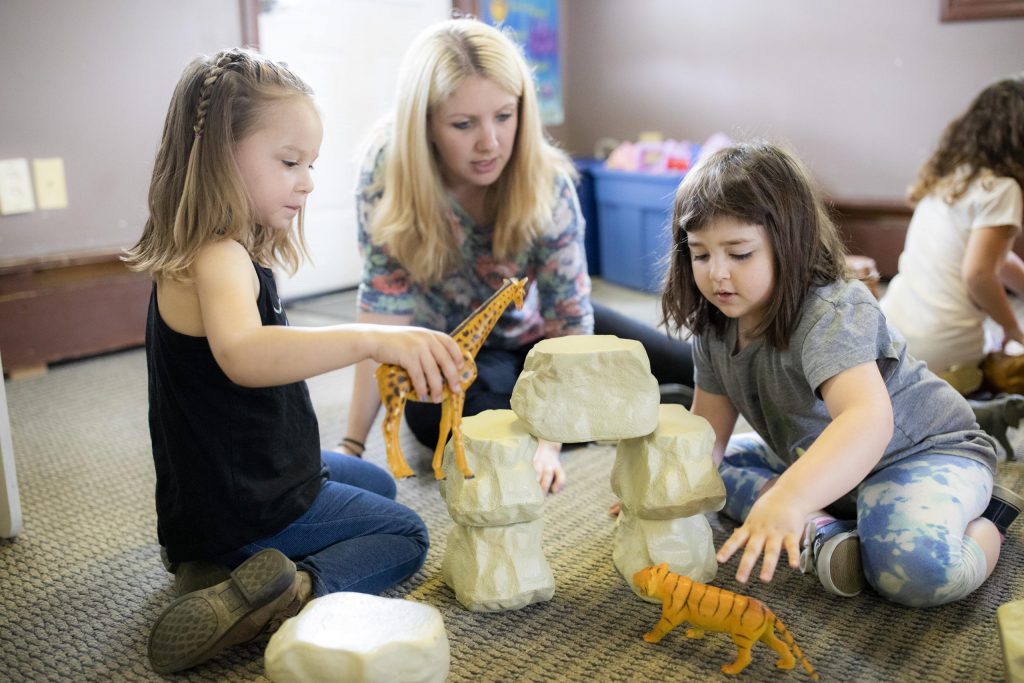Strengthening Families
What is Family Engagement?
What is the Strengthening Families Framework?
The Strengthening Families Framework is a family engagement approach that is based on the strengths of the family, child, Provider and community. The Framework increases family supports, enhances child development and reduces risks pertaining to child abuse and neglect. The approach includes five universal protective factors which support family engagement and increase knowledge in order to achieve positive outcomes for children. At its heart, Strengthening Families is about how families are supported to build key protective factors that enable children to thrive.
How Do I Adopt the Strengthening Families Framework?
In order to adopt the Strengthening Families Framework, a provider should complete a self-assessment which will help assess their current level of understanding and practices related to family engagement. These tools were created and revised to encompass concrete and measurable actions to support the Framework. Through the process, providers can survey staff members, families and community members about their interpretation of the program’s current practices surrounding the Protective Factors. Providers should also conduct a debriefing session and goal setting process in order to increase their knowledge and improve their implementation of the Protective Factors.
For more information on how to utilize these tools we suggest you to browse the “Center for the Study of Social Policy’s” website. For quality coaching surrounding how to adopt the Strengthening Families Framework, we invite you to apply for our Progressive Training and Technical Assistance Program!
What are the Protective Factors?
The Five Protective Factors “are the foundation of the Strengthening Families approach. Families thrive when protective factors are robust in their lives and communities. By providing parents, child care professionals and others who work with children more information about these protective factors, we can help build protective factors in families with young children, building on family strengths and promoting optimal child and youth development.” NH Children’s Trust

How Can I Learn More?
CCAoNH Professional Development Opportunities:
- Early Childhood Focused Collaborative Meeting: Family Engagement and Communication
- Progressive Training and Technical Assistant Program: Strengthening Families, Strengthening Care
- SMART Goals Action Plan
Family Resource Centers
Family Resource Centers may offer the following services to families:
- Fuel Assistance: Helps families access programs and services to keep their homes safe and comfortable.
- Healthcare Navigation: Guides families in choosing a health care plan that fits their needs and helps connect families with the right providers.
- Recovery Services: Offers information to families or their loved ones on choosing the services that is right for them.
- Food & Nutrition: Provides information to families on accessing food resources and understanding nutrition.
- Referrals Services: Connects families with legal, physical, behavioral health and other community services.
- Trainings: Leads, hosts and connects families and individuals to trainings through the region.
Parental Resilience:
“Caregivers show inner strength, flexibility & courage to manage stress during challenges, adversity and trauma”
(Children’s Trust Fund Alliance, n.d.).
Ideas to promote Parental Resilience:
- Knowledge of Support Groups: by understanding the unique needs of families within the program, knowing local support groups or hosting support groups onsite may help families to develop resiliency. A families’ local Family Resource Center may offer family support groups. Click here to find your local family Resource Center.
- Parent Check-Ins: greeting and maintaining relationships with the families is just as important as working with the children. Through family check-ins, providers may identify any trainings, resources and tools they may be able to provide to promote resiliency.
- Partnerships with Families: the partnership with families is an important piece in allowing the parent to understand their role. We want to empower families to be active decision makers on behalf of their child and give them the tools to advocate for them.
- Promotion of Family Culture: making families feel valued and represented within the program. Community plays a large part in the way they view themselves and their family. If they are welcomed, accepted and respected in theory, they should feel secure and safe within the community.


Concrete Support in Times of Need:
“Everyone needs help sometimes; it’s ok to ask. Resilience is gained when parents know to whom & where to go for help and basic needs” (Children’s Trust Fund Alliance, n.d.).
Ideas to promote Concrete Support in Times of Need:
- Onsite Resource Center: the provider may place local resource brochures in this space for families to take and utilize at their own convenience.
- Resource Tab on Website: online resources may protect the privacy of families, as they will beable to find the resources on their own. View the Resources Page.
- Local Support Groups: by researching and knowing about local support groups and tools, families may find a
network of like minded individuals. - Statewide Supports: by posting information for 2-1-1 and NH Easy, families may find the ability to unlock resources right away in terms of State benefits.
Social Connections:
“People need people. Parents need and value friends, family, neighbors, co-workers and others in the community who care about them and their children” (Children’s Trust Fund Alliance, n.d.).
Ideas to promote Social Connections:
- Non-Educational Events: by providing events where families can network together they can begin to form a support system. We want families to feel supported in their role, and find others with similar situations. By providing open events, families can work to improve their own social skills within the program community. Examples: family fun nights, grandparent teas, holiday celebrations with families, stay and plays, potluck dinners, etc.
- Inclusive Environment: by creating the warm and welcoming environment, we are allowing families to find support within the program. Open door communication is key to ensuring families feel secure enough to connect with others.
- Family Directories: the use of directories can help families to connect with others during times of need. They may have access to skilled professionals and be able to connect with the family of their child’s best friend.
- Open Groups for Communication: by creating a bulletin board or online community where families can plan times to get together outside of program hours. Programs might be able to foster more social connections within the community. The Child Care Aware of NH for Families Facebook Page is a great resource to find statewide community events.


Knowledge of Parenting and Child Development:
“Parenting is part natural & part learned. Kids thrive when caregivers understand child growth and are responsive to children’s needs, which foster secure attachments and brain development” (Children’s Trust Fund Alliance, n.d.).
Ideas to promote Knowledge of Parenting and Child Development:
- Promoting the VROOM App: free app which helps families engage in activities with their child and then provides them with an explanation of how this affects the child’s brain development. Families find out how to turn every day moments into brain building moments. For more information check out the Vroom website.
- Family Events/Chats: the idea behind families coming together is similar to that of a parenting class. It may cover various topics defined by the families or promoted for families based on observations.
- Onsite Resource Center: by providing this space the provider can display information pertaining to local parenting events in the community and child development materials to help families find new sources of information. For materials and information to share with families, check out the Helping Children Grow Page.
- Parent and Teacher Conferences: by offering conferences programs are providing families the opportunity to utilize them as a resource. This helps them to better understand child development.
Social and Emotional Competence of Children:
“Through relationships with consistent, caring and attuned adults, children feel loved, have the ability to get along with others and have a sense of belonging” (Children’s Trust Fund Alliance, n.d.).
Ideas to promote the Social and Emotional Competence of Children:
- Using the ASQ-SE: this will help to assess the child’s social and emotional skills, while connecting with the family. By filling out the ASQ-SE, families will develop their understanding of child development and help to communicate the needs of the child.
- Onsite Resource Center: this area should be accessible by families and may include articles to help families promote social emotional competence in children.
- Zero to Three Website: The Zero to Three website is a wonderful resource which may provide articles and resources to help families and educators understand the value and importance of social emotional competence.
- Language Which Highlights Feelings: this approach helps children develop the language that helps them associate what they feel with the identified feeling.

